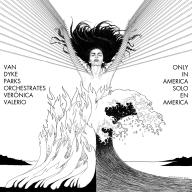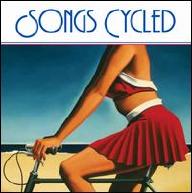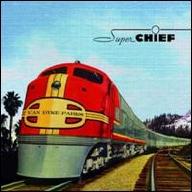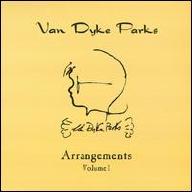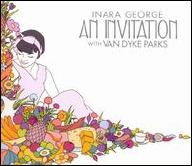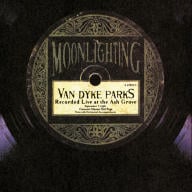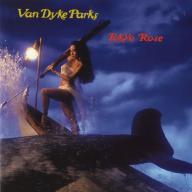Born in Hattiesburg, Mississippi on January 3, 1941, Van Dyke Parks is the son of a doctor whose focus was neurology and psychiatry; his father was also an amateur musician who played clarinet in a dance band to help pay his way through school, and the Parks home housed not one, but two grand pianos. Van Dyke followed his father's lead and took up the clarinet at the age of four. Judged a musical prodigy, young Parks attended the American Boychoir School in Princeton, New Jersey, where he studied vocal music and piano. He also worked as a child actor, on-stage and on television, co-starring with Ezio Pinza in the 1953 comedy series Bonino, and also worked in the movies, including Grace Kelly's final film The Swan (1958).
After completing high school, Parks studied music at the Carnegie Institute of Technology (where the faculty included Aaron Copland), but dropped out in 1963 to relocate to the West Coast. Teaming with his brother Carson Parks, the siblings formed a folk duo, the Steeltown Two, which later grew into the Greenwood County Singers; Parks would eventually leave the group to work with a more commercially successful folk act, the Brandywine Singers. Around this time, he earned his first credit as an arranger when Terry Gilkyson asked him to help with his recording of the song "The Bare Necessities," which would be used in the Disney animated feature The Jungle Book. Parks began exploring pop songwriting, and one of his early compositions, "High Coin," was cut in 1965 by Rick Jarrard; it would later be covered by Harpers Bizarre, the Charlatans, and Jackie DeShannon. Soon Parks was signed to MGM Records as a solo artist, releasing his debut single, "Come to the Sunshine" b/w "Farther Along," in 1966; he was also very briefly a member of Frank Zappa's Mothers of Invention, though he left after frequent disagreements with the headstrong bandleader. After doing session work for the likes of the Byrds, Judy Collins, and Paul Revere the Raiders (as well as a duo known as Anthony & Cleopatra, who would enjoy greater success as Sonny Cher), Parks landed a record deal with Warner Bros., though for reasons best known to himself, he opted to bill himself as George Washington Brown for one of his first Warner Bros. singles, an elaborately orchestrated version of "Colours" by Donovan. Another of his early projects at the label was giving a talented but only moderately successful surf band called the Tikis a creative makeover; he helped reshape them into the sunny Baroque pop act Harpers Bizarre, who would score a handful of hits between 1967 and 1970, and cover Parks' "Come to the Sunshine."
Through his session work, Parks became friendly with producer Terry Melcher, who in 1966 introduced him to Brian Wilson, who was looking for a lyricist and creative partner for his follow-up to the groundbreaking Beach Boys album Pet Sounds. Wilson and Parks hit it off, and together they wrote the lion's share of the songs that would become SMiLE, the Beach Boys album that was regarded as one of rock's lost masterpieces when Wilson chose to abandon the project before it was fully completed. While the public would hear little of Parks' work with Wilson for many years, it was a powerful item on his résumé; his services in the studio were in increasingly high demand, as was his writing music for movies, TV, and commercials. In 1968, Warner Bros. gave him the green light to make his own album; created at the expense of over $35,000 (a huge sum at the time), Song Cycle was an eclectic and richly orchestrated set of songs that pushed at the boundaries of pop music. The album was well-received by critics (and was named "Record of the Year" by High Fidelity/Stereo Review magazine), but it was a commercial failure, and Warner Bros. would try to revive interest in it with an infamous ad with the headline, "How we lost $35,509 on 'the album of the year' (dammit)."
After SMiLE vanished and Song Cycle failed on the charts, Parks focused on his work as a staff producer and arranger at Warner Bros., where he produced debut albums for Randy Newman and Ry Cooder as well as projects for Arlo Guthrie and Phil Ochs. In 1971 he produced a passion project, Esso, by the Esso Trinidad Steel Band, which allowed him to indulge his love for calypso music. It would also his inform his second solo album, 1972's Discover America, which blended Caribbean songs about American culture with American songs performed in the Trinidad style. Parks would take a closer look at idiosyncratic American music on his third solo effort, 1976's Clang of the Yankee Reaper, but like Discover America, it fell on deaf ears beyond a few adventurous listeners, and he retreated into session work as well as creating audio-visual promotional materials for Warner Bros. He developed an addiction to prescription drugs, and once he beat it, he opted out of the record industry for a while to devote more time to working in film and television, writing and arranging scores (his most interesting project was scoring Robert Altman's Popeye with Harry Nilsson) and taking occasional acting gigs.
In 1984, Parks made a comeback with the album Jump!, a musical adaptation of the Uncle Remus stories of author Joel Chandler Harris, which earned laudatory reviews and reminded discriminating music fans that he was still a talent to be reckoned with. He continued to contribute to albums by other artists -- Peter Case, Victoria Williams, T-Bone Burnett, and U2 all called on his services as an arranger, and he appeared on the sessions for the Beach Boys' hit "Kokomo," though he insists he was unaware that Brian Wilson was not involved in the recording when he was asked to participate. 1989 brought another new LP, a concept album about the uneasy relationship between America and Japan titled Tokyo Rose. He also provided the music for a 1991 album in which Jodie Foster read the classic children's story The Fisherman his Wife. Parks and Brian Wilson reunited in the studio for the 1995 album Orange Crate Art, in which Wilson provided the vocals for 11 songs from Parks' pen (as well as a cover of George Gershwin's "Lullaby"). A 1996 concert with Parks singing and leading an orchestra at the Hollywood nightspot the Ash Grove was issued in 1998 under the title Moonlighting, and it offered a lively overview of the first three decades of his career.
In 2003, Brian Wilson set out on a concert tour in which he performed the Beach Boys' Pet Sounds in full, and Parks was brought in to write the arrangements and lead the orchestra. The tour was a success, and in 2003, Wilson was persuaded to stage a live performance of the SMiLE song cycle in London, and Parks became involved in the project. After a series of concerts that for the first time presented the songs in a sequence and format approved by the composers, Wilson and his band went into the studio, and in 2004, the release of Brian Wilson Presents SMiLE allowed Parks to bask in a bit of the glory as the legendary lost album finally became a reality. Wilson and Parks would reunite four years later when Parks wrote lyrics and narration for Wilson's album That Lucky Old Sun. Parks also worked on string arrangements for indie harpist Joanna Newsom's second album, Ys, an involved and ambitious work that became a critical favorite. In 2009, Parks appeared alongside Ry Cooder and Bob Dylan as part of the documentary The People Speak, a film that saw musicians scoring a series of letters, speeches, and diary entries from various historical figures. The next project to focus solely on Parks' music came in 2011 when he began issuing a series of 7" singles featuring a variety of never-before-released material including new original songs, archival recordings, cover songs, and re-recordings of older tunes. The 12 songs from this project were eventually compiled and released in 2013 as an album titled Songs Cycled. In 2013, Parks also released Super Chief: Music for the Silver Screen, an orchestral concept album fashioned from music he had written for movies over the years; originally issued as a collector's item for Record Store Day 2013, the album received a wider release in 2014. Guatemalan-born vocalist Gaby Moreno would collaborate with Parks for their 2019 project ¡Spangled!, in which she accompanied Parks' orchestral arrangements for a collection of songs primarily from South and Central America. ~ Mark Deming, Rovi


